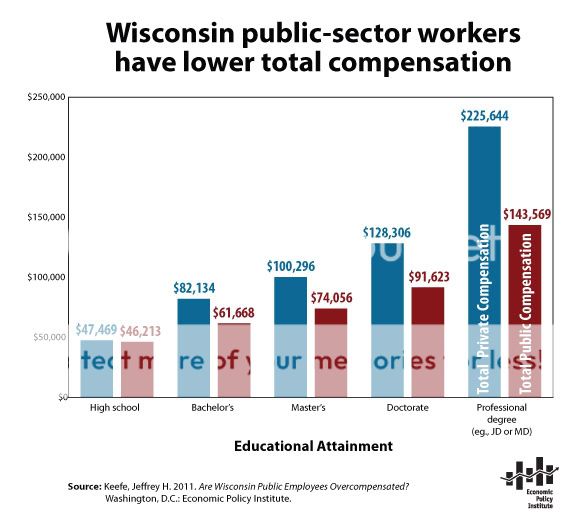Contrary to conventional wisdom that public employees across our nation are collecting bigger paychecks than their counterparts in the private sector, the Economic Policy Institute has found quite the contrary. That's true in Wisconsin and Ohio, which have become the latest battle fronts in the right-wing's 65-year-long effort to gut the legal collective bargaining rights of Americans that were established after decades of bloody struggle during the New Deal.

In Wisconsin, which has become a focal point in this debate, public servants already take a pretty hefty pay cut just for the opportunity to serve their communities ... The figure below shows that when comparing the total compensation (which includes non-wage benefits such as health care and pensions) of workers with similar education, public-sector workers consistently make less than their private–sector peers. Workers with a bachelor’s degree or more—which constitute nearly 60% of the state and local workforce in Wisconsin—are compensated between $20,000 less (if they just have a bachelor’s degree) to over $82,000 a year less (if they have a professional degree, such as in law or medicine).
Here are the figures broken down by education, as evaluated by EPI.

The deficit that Wisconsin faces is caused by the current economic downturn and the recent tax cut package. It has nothing to do with the compensation of the people that educate our children, keep the streets safe and clean, keep dangerous chemicals out of our water, and keep insurance companies from taking advantage of us. These public servants are already paid less than those in the private sector, and nationally, this gap has actually been increasing over the past few decades ...
The situation in Ohio is quite similar. In a "rigorous analysis" of full-time state and local government workers in Ohio, EPI found that they are undercompensated by 6 percent. The analysts screened for variables including hours of work, organizational size, gender, race, ethnicity, experience, citizenship and disability.
Among EPI's findings:
• On an annual basis, full‐time state and local workers and school employees are undercompensated by 6.0% in Ohio, in comparison with otherwise similar private‐sector workers. When comparisons are made for differences in annual hours worked, the gap remains, albeit at a smaller percentage of 3.5%.
• Ohio public‐sector workers are more highly educated than private‐sector workers; 49% of full‐ time public‐sector workers hold at least a four‐year college degree, compared with 26% in the private‐sector.
• Ohio’s state and local governments and school districts pay college‐educated workers 25% less in total compensation, on average, than private employers.
• In addition to having higher education levels, Ohio state and local government employees, on average, are also more experienced (23.2 years) than their private‐sector counterparts (21.7 years).
While some of the effects of the Great Recession have had a delayed impact on public employees, that impact is being felt big time now. Tens of thousands of lay-offs, furlough days, pay freezes and pay-cuts, and a continuing assault on public employees' health benefits (something that has been going on through premium raises and cuts in coverage for years) are all part of the damage being done.
While the likes of renowned liar and Andrew Breitbart pretends to be a friend of the little guy who he claims is being gouged by public workers such as those in Wisconsin and Ohio, the truth is that the efforts now being carried out are a culmination of the long-standing attacks against the whole concept of unions. Breitbart, Rush Limbaugh and the governors are mere mouthpieces for an oligarchy feeling its oats and viewing the current situation as another opportunity to weaken the resistance to their agenda. One word, one attitude should describe the progressive agenda at this critical moment. It's a word and attitude we've seen revived in the past few days after a long dormancy: Solidarity!


